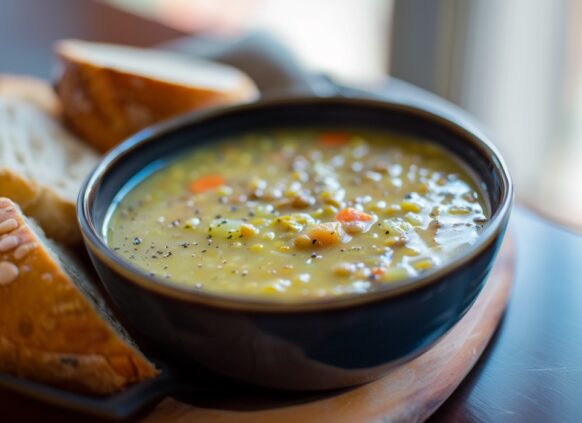
How to enjoy Christmas without weight gain + how a dietitian does it
Christmas parties, meals out, Christmas Day, Boxing Day, and New Year’s Eve – losing weight at Christmas may feel challenging. It can seem like there’s pressure to join in all the eating and drinking, whether you celebrate the season or not.
However, you can get involved in the festivities without gaining weight. Learn how to enjoy Christmas healthily and how one of our Lead Dietitians, Lucy, balances enjoying the festive season with healthy living. If you’d like support from Dietitians like Lucy, you might be interested in Oviva’s NHS-funded weight management programme.
Key Takeaways
- It’s not unusual to gain weight over Christmas, but you don’t need to see it as inevitable.
- With careful planning, you can avoid or minimise weight gain; and losing weight at Christmas is not out of the question.
- Try to adopt an 80/20 approach – 80% healthy eating, with 20% left over for treats.
- Oviva can support you as you manage your weight over the holidays.
Is it normal to gain weight over Christmas?
Overeating at Christmas is common – Christmas weight gain is nothing to feel ashamed of, but it’s not inevitable either. And people do not generally put on as much weight as you might expect, with one NoHoW Project study finding that the average weight gain for the festive period was 1.35% of total body weight.
Having some healthier habits to build into your festive routine can be helpful if you’re trying to manage your weight over Christmas. If you do experience some weight gain over Christmas, it’s okay. It’s not about feeling guilty but about getting back in touch with healthy habits that support your weight loss journey.
You can also explore our tips for losing weight after Christmas, too.
Tips to keep your diet on track over Christmas
When trying to keep your diet on track, you’ll need to consider two main areas: Christmas Day itself and the broader festive period.
It’s worth noting that even if you do not celebrate Christmas, you may still experience “food noise”, including TV adverts, invitations to events, discussions with friends and deals in shops.
The festive season
Minimising weight gain at Christmas can be supported by looking at the small, incremental ways you can build healthy habits that feel good over the festive season.
It’s perfectly natural to experience more food noise in the weeks before and after Christmas Day. Try to plan by setting a weight maintenance goal and by following your healthy diet plan as much as possible while leaving some room for treats. Manage your portion sizes by using smaller plates at meal times and filling around half of your plate with vegetables.
You can also think about making some adjustments to prevent Christmas weight gain without feeling like you can’t enjoy the festive season.
For example, if you want to drink alcohol on Christmas Eve, Boxing Day or New Year’s Eve, there’s no need to avoid it entirely, but why not switch to lower-calorie drinks? Avoid sugary drinks, like alcopops, or options high in calories, like eggnog.

If you’ve already started your weight loss journey, think about healthy behaviours you’ve built up that you enjoy or feel good about. Maintain these as much as possible, as building positive habits can make it easier to stick to a diet for the festive period.
Where you can, keep up any exercise you’ve been doing, whether going for walks, swimming, cycling or strength training. You might find that you can’t do the same amount as you would do the rest of the year, as it’s a busier period – the key is consistency not perfection.
Try to focus on ways to be active each day that feel good for you. Taking a wintery walk, booking onto a festive wellness event or inviting friends to an exercise class are just some ideas.
Christmas Day
When thinking about how to not gain weight over Christmas, it can help to plan for Christmas Day in advance so that you have sensible preparations that make all the difference.
Start with a healthy breakfast and see if you can make positive substitutions. For example, if you’d normally have a bacon sandwich, consider switching to grilled turkey bacon and wholewheat bread or a lighter high-protein meal, like cooked tomatoes and scrambled eggs.
After breakfast, try going for a morning walk. Not only can this help with weight management, but it can also put you in a more positive headspace.
Set yourself a realistic target for the number of alcoholic drinks you’ll have, or switch to non-alcoholic alternatives if you can. Stay hydrated generally, too.
Buy healthy snacks you can enjoy and feel like you’re indulging while avoiding high-calorie, ultra-processed foods. Examples include a handful of unsalted nuts, a satsuma, or roasted chickpeas.
Get plenty of sleep the night before. Do your best to manage stress, be present and enjoy the time with your loved ones. Stress can trigger unhealthy eating, so be kind to yourself.
If you’re cooking Christmas dinner, consider healthy modifications, like trading goose fat for olive oil or using wholegrain stuffing. Aim to fill half your plate with vegetables, a quarter with lean protein and a quarter with carbohydrates.

How our Clinical Lead Dietitian stays healthy at Christmas
We spoke to Lucy Diamond, Clinical Lead Dietitian at Oviva, about how she stays healthy over the holidays and what you can do to optimise your diet for Christmas.
What is your top tip for managing weight over the festive period?
Lucy: My top tip is to follow the 80/20 rule as much as possible – eating healthily 80% of the time and using the remaining 20% for treats. Going through the Christmas period without treating yourself is usually unrealistic, so prioritise moderation.
What else can people do to avoid putting on weight over Christmas?
Lucy: Try to compensate for larger meals. Pair indulgent meals with lighter options during the rest of the day. For example, you might have your preferred Christmas lunch but pair it with a vegetable-based meal in the evening.
How do you deal with events where alcohol is encouraged and healthy foods are hard to find?
Lucy: It’s best to focus on moderation in these situations. Rather than entirely avoiding alcohol, it may be easier to set a sensible limit and try to select low-calorie options.
If you’re at an event with only unhealthy foods, try not to over-indulge and remember, it’s okay to politely decline too. Try to think about the guidance you’d give friends in the same situation.
Do you have any other advice for people hoping to limit Christmas weight gain?
Lucy: Get out in the fresh air. If possible, go for a walk every day, no matter how short. This is great for the mind and body and will also help you get some vitamin D.
Managing emotions around Christmas
The festive period can be emotionally challenging, especially if you’re trying to lose weight around Christmas. You may feel left out if you’re unable to indulge like others or feel ashamed if you do indulge.
Even without the food noise, Christmas can stir up complicated feelings, and stress or anxiety may trigger overeating. Take care of your mental health during this time by speaking kindly to yourself, resting, spending time outdoors and making sure to do more of what you enjoy.
Christmas and the holidays can be a challenging time when it comes to managing eating, especially with the pressure to overindulge and the emotional impact the season can have.
Remember that food is just one part of the celebration—it’s okay to focus on the connections, laughter, and moments that make the season special.
If the holidays are emotionally tough and you find yourself turning to food for comfort, try to pause and ask yourself what you truly need at that moment. Be kind to yourself, and if you do overeat, remember it’s normal at this time of year, and guilt only adds unnecessary stress. Holidays are about looking after yourself, not perfection. Your well-being matters most.
– Victoria Lawson, Global Clinical Lead for Psychology at Oviva

Stay on track over Christmas with Oviva
Oviva is an NHS-accredited weight management service that provides expert advice and support from dietitians, psychologists, doctors, nurses, and other healthcare professionals.
Engage with your own personal coaching team, track your progress using the Oviva app and receive prescription weight loss medication. On average, our patients lose 13.6kg in 12 months.
Our personalised approach to healthcare can help you manage your weight over Christmas and at various other challenging times of the year.
Your GP can tell you if you’re eligible and refer you to Oviva’s programme.
Eligibility includes a BMI over 35 and at least one weight-related health condition, like high cholesterol and type 2 diabetes.



